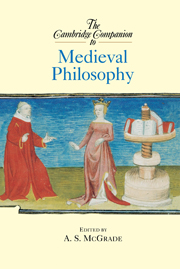29 results
Biographies of Major Medieval Philosophers
-
- Book:
- The Cambridge Companion to Medieval Philosophy
- Published online:
- 28 May 2006
- Print publication:
- 07 August 2003, pp 350-359
-
- Chapter
- Export citation
Frontmatter
-
- Book:
- The Cambridge Companion to Medieval Philosophy
- Published online:
- 28 May 2006
- Print publication:
- 07 August 2003, pp i-xviii
-
- Chapter
- Export citation
Bibliography
-
- Book:
- The Cambridge Companion to Medieval Philosophy
- Published online:
- 28 May 2006
- Print publication:
- 07 August 2003, pp 360-397
-
- Chapter
- Export citation
Index
-
- Book:
- The Cambridge Companion to Medieval Philosophy
- Published online:
- 28 May 2006
- Print publication:
- 07 August 2003, pp 398-405
-
- Chapter
- Export citation

The Cambridge Companion to Medieval Philosophy
-
- Published online:
- 28 May 2006
- Print publication:
- 07 August 2003
Introduction
-
-
- Book:
- The Cambridge Companion to Medieval Philosophy
- Published online:
- 28 May 2006
- Print publication:
- 07 August 2003, pp 1-9
-
- Chapter
- Export citation
Chronology of philosophers and major events
-
- Book:
- The Cambridge Companion to Medieval Philosophy
- Published online:
- 28 May 2006
- Print publication:
- 07 August 2003, pp 347-349
-
- Chapter
- Export citation
12 - Natural Law and Moral Omnipotence
-
-
- Book:
- The Cambridge Companion to Ockham
- Published online:
- 28 May 2006
- Print publication:
- 13 December 1999, pp 273-301
-
- Chapter
- Export citation
Richard Hooker&s Doctrine of the Royal Supremacy. By W. J. Torrance Kirby. (Studies in the History of Christian Thought, XLIII.) Pp. xi+136 incl. frontispiece. Leiden: Brill, 1990. Gld. 72. 90 04 08851 2; 0081 8607
-
- Journal:
- The Journal of Ecclesiastical History / Volume 44 / Issue 2 / April 1993
- Published online by Cambridge University Press:
- 06 February 2009, pp. 315-319
- Print publication:
- April 1993
-
- Article
- Export citation
Principal dates in Hooker's life and in the publication of his work
-
- Book:
- Hooker: Of the Laws of Ecclesiastical Polity
- Published online:
- 05 June 2012
- Print publication:
- 28 July 1989, pp xxxi-xxxi
-
- Chapter
- Export citation
Bibliographical note
-
- Book:
- Hooker: Of the Laws of Ecclesiastical Polity
- Published online:
- 05 June 2012
- Print publication:
- 28 July 1989, pp xxxii-xxxiv
-
- Chapter
- Export citation
Contents
-
- Book:
- Hooker: Of the Laws of Ecclesiastical Polity
- Published online:
- 05 June 2012
- Print publication:
- 28 July 1989, pp v-viii
-
- Chapter
- Export citation
THE FIRST BOOK. Concerning laws, and their several kinds in general
- from Of the Laws of Ecclesiastical Polity
-
- Book:
- Hooker: Of the Laws of Ecclesiastical Polity
- Published online:
- 05 June 2012
- Print publication:
- 28 July 1989, pp 52-127
-
- Chapter
- Export citation
Preface
-
- Book:
- Hooker: Of the Laws of Ecclesiastical Polity
- Published online:
- 05 June 2012
- Print publication:
- 28 July 1989, pp ix-x
-
- Chapter
- Export citation
THE EIGHTH BOOK. Their Seventh Assertion, That unto no Civil Prince or Governor there may be given such power of Ecclesiastical Dominion as by the Laws of this Land belongeth unto the Supreme Regent thereof
- from Of the Laws of Ecclesiastical Polity
-
- Book:
- Hooker: Of the Laws of Ecclesiastical Polity
- Published online:
- 05 June 2012
- Print publication:
- 28 July 1989, pp 128-226
-
- Chapter
- Export citation
Of the Laws of Ecclesiastical Polity
-
- Book:
- Hooker: Of the Laws of Ecclesiastical Polity
- Published online:
- 05 June 2012
- Print publication:
- 28 July 1989, pp -
-
- Chapter
- Export citation
Frontmatter
-
- Book:
- Hooker: Of the Laws of Ecclesiastical Polity
- Published online:
- 05 June 2012
- Print publication:
- 28 July 1989, pp i-iv
-
- Chapter
- Export citation
A Guide to Hooker's sources and to the Elizabethan debate about religion and society.
-
- Book:
- Hooker: Of the Laws of Ecclesiastical Polity
- Published online:
- 05 June 2012
- Print publication:
- 28 July 1989, pp 227-240
-
- Chapter
- Export citation
A PREFACE. TO them that seek (as they term it) the reformation of Laws, and orders Ecclesiastical, in the Church of ENGLAND
- from Of the Laws of Ecclesiastical Polity
-
- Book:
- Hooker: Of the Laws of Ecclesiastical Polity
- Published online:
- 05 June 2012
- Print publication:
- 28 July 1989, pp 1-51
-
- Chapter
- Export citation
Subject Index
-
- Book:
- Hooker: Of the Laws of Ecclesiastical Polity
- Published online:
- 05 June 2012
- Print publication:
- 28 July 1989, pp 246-247
-
- Chapter
- Export citation



